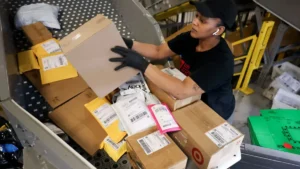The demand for medical courier services is growing rapidly. Hospitals, clinics, pharmacies, and laboratories all rely on professional couriers to transport sensitive materials such as prescriptions, lab specimens, and medical equipment. If you’re interested in starting a career in logistics with a focus on healthcare, you might be thinking about: how to become a medical courier?
This guide covers everything you need to know — from qualifications and training to industry opportunities and compliance requirements.
What Does A Medical Courier Do?
A medical courier is responsible for transporting healthcare-related items that require extra care, security, and timeliness. Unlike traditional delivery drivers, medical couriers handle shipments that can directly affect patient health and safety.
Responsibilities include:
- Picking up and delivering lab samples, medical records, and prescriptions
- Transporting specialized medical equipment and supplies
- Following strict handling procedures for specimens and temperature-sensitive items
- Maintaining confidentiality in compliance with HIPAA regulations
- Logging deliveries for accuracy and accountability
Because of these responsibilities, a medical delivery courier plays an important role in the healthcare system.
What are the qualifications for becoming a medical courier?
To become a medical courier in 2025, you’ll need a mix of driving credentials, compliance knowledge, and professional skills. While advanced medical training isn’t required, employers expect reliability, attention to detail, and adherence to healthcare regulations.
Key QualifICation include:
-
High school diploma or equivalent
-
Valid driver’s license and clean driving record
-
Reliable transportation for medical deliveries
-
Knowledge of HIPAA compliance and patient privacy rules
-
Ability to pass background checks and drug screenings
-
Strong organizational and time management skills
-
Experience in logistics or healthcare delivery (preferred)
-
Optional OSHA or medical courier training certifications
Why Choose a Career As a Medical Courier
Working in medical logistics offers several benefits:
- Job Security: Healthcare is an essential industry. As the need for medical testing and home healthcare expands, demand for lab logistics and medical courier services continues to rise.
- Flexible Scheduling: Many couriers work full-time, while others take on part-time or on-demand routes.
- Meaningful Work: Unlike standard deliveries, medical couriers directly support patient care.
- Entry-Level Friendly: In many cases, you don’t need advanced degrees to start — just training, professionalism, and reliability.
Requirements To Become a Medical Courier
If you’re considering this career path, the following are the common qualifications for the position:
1. Valid Driver’s License & Reliable Vehicle
Most positions require a driver’s license and access to a clean vehicle. Some medical courier companies provide fleet cars, but many expect couriers to use their own.
2. Background Checks & Drug Testing
Because of the sensitive, life-impacting materials during deliveries, an employer will require drug tests and often will conduct background checks.
3. Training in Handling Medical Items
Medical couriers need to understand:
- Proper packaging and labeling of specimens
- Cold-chain logistics for temperature-sensitive materials
- Safety and biohazard handling procedures
Some companies provide this training, while others may expect prior experience in logistics or healthcare.
4. HIPAA Compliance Knowledge
Couriers often handle items that contain patient information. Knowing and following HIPAA regulations is crucial to avoid, privacy breaches.
5. Insurance & Business Setup (If Independent)
If working independently as a medical delivery courier, you will likely need car insurance that meets the following:
- Commercial auto insurance
- Cargo or liability insurance
- Business registration (LLC or sole proprietorship)
Steps to Become a Medical Courier
The following is a step-by-step roadmap:
Step 1: Research Local Medical Courier Companies
Start by searching for medical courier services in your area. Some hospitals, labs, and logistics companies post open positions.
Step 2: Prepare Your Application
The most effective applications, particularly for entry-level positions, highlight your experience with driving, logistics, customer service, or healthcare. You must emphasize that you are dependable, attentive to detail, and professional.
Step 3: Complete Training & Certifications
Some positions may require certifications such as:
- Bloodborne Pathogen Training
- OSHA Safety Training
- Medical specimen handling courses
Step 4: Build a Professional Image
If you’re an independent, you must consider branding. Waiting for an order in a professional uniform, in a vehicle that has your logo on the side, is the first step in establishing a trusting relationship with a healthcare provider.
Step 5: Deliver With Care & Consistency
Consistency is key. In this industry, reliability can determine long-term contracts and repeat clients.
Opportunities in Medical Courier Services
Medical couriers can work in several areas:
- Hospitals & Clinics – Transporting lab specimens, test results, and medical supplies
- Pharmacies – Delivering prescriptions to patients or healthcare facilities
- Laboratories – Handling time-sensitive specimens for testing
- Home Healthcare – Supporting patients with direct delivery of medical equipment or medications
- Specialized Logistics Firms – Companies dedicated to lab logistics medical courier services often contract with multiple providers
Skills That Set You Apart
To succeed as a medical courier, develop these skills:
- Attention to Detail – Accuracy in logging deliveries and following procedures
- Time Management – Meeting deadlines is critical in healthcare logistics
- Communication – Coordinating with lab staff, nurses, and patients
- Professionalism – Representing healthcare providers requires courtesy and trustworthiness
Future of Medical Courier Services
In 2025 and beyond, medical courier services will be reshaped by technology, stricter compliance, and sustainability. Increasing demand for fast, secure, and temperature‐controlled delivery of medical supplies—such as vaccines, lab specimens, and precision pharmaceuticals—is pushing the industry toward smarter operations, greener practices, and real-time transparency.
For anyone exploring how to become a medical courier, this means more opportunities, better tools, and a growing demand for reliable professionals.
conclusion:
Becoming a medical courier is more than just a job—it’s a meaningful career that supports patient health and strengthens the healthcare system. Couriers are responsible for safely transporting lab specimens, prescriptions, and vital medical supplies under strict regulations. With the right training, certifications, and reliability, you can build a trusted career in this fast-growing industry.
Key steps to succeed as a medical courier:
-
Meet basic qualifications: high school diploma, valid driver’s license, and clean record
-
Gain knowledge of HIPAA compliance and healthcare delivery rules
-
Complete optional training or certifications for added credibility
-
Develop organizational, communication, and time management skills
-
Build strong relationships with hospitals, clinics, and laboratories
-
Use reliable, well-maintained transportation for secure deliveries
-
Focus on professionalism and consistency to grow your reputation
With healthcare logistics expanding in 2025 and beyond, skilled medical couriers are in high demand.
FAQs Related Medical Courier Services
Q1. What does a medical courier do?
A medical courier is responsible for delivering lab specimens, blood samples, prescriptions, medical records, and other sensitive healthcare items on time and properly.
Q2. Do you need a license to be a medical courier?
You must have a valid driver’s license and a clean driving record. While not required, HIPAA training and OSHA safety courses are recommended.
Q3. How much does a medical courier make in 2025?
Medical couriers usually make $15 – $25 per hour. Independent contractors can make more depending on routes, contracts, and demand in their area.
Q4. Is the medical courier profession flexible?
Yes. Many couriers work flexible hours as independent contractors while some work full-time for courier companies or healthcare providers.
Q5. What skills are important for a medical courier?
The professional skills most important for medical couriers are Time management, organization, attention to detail, professionalism and understanding of HIPAA compliance.
Q6. How do I start a medical courier business?
In order to start up your own service, you will need business registration, insurance, reliable vehicles, compliance training, and contracts with healthcare facilities








